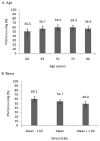The influence of stress, depression, and anxiety on PSA screening rates in a nationally representative sample
- PMID: 22955835
- PMCID: PMC3494796
- DOI: 10.1097/MLR.0b013e318269e096
The influence of stress, depression, and anxiety on PSA screening rates in a nationally representative sample
Abstract
Background: Prostate-specific antigen (PSA) testing for prostate cancer is controversial, with concerning rates of both overscreening and underscreening. The reasons for the observed rates of screening are unknown, and few studies have examined the relationship of psychological health to PSA screening rates. Understanding this relationship can help guide interventions to improve informed decision-making for screening.
Methods: A nationally representative sample of men 57-85 years old without prostate cancer (N = 1169) from the National Social life, Health and Aging Project was analyzed. The independent relationship of validated psychological health scales measuring stress, anxiety, and depression to PSA testing rates was assessed using multivariable logistic regression analyses.
Results: PSA screening rates were significantly lower for men with higher perceived stress [odds ratio (OR) = 0.76, P = 0.006], but not for higher depressive symptoms (OR = 0.89, P = 0.22) when accounting for stress. Anxiety influences PSA screening through an interaction with number of doctor visits (P = 0.02). Among the men who visited the doctor once those with higher anxiety were less likely to be screened (OR = 0.65, P = 0.04). Conversely, those who visited the doctor 10+ times with higher anxiety were more likely to be screened (OR = 1.71, P = 0.04).
Conclusions: Perceived stress significantly lowers PSA screening likelihood, and it seems to partly mediate the negative relationship of depression with screening likelihood. Anxiety affects PSA screening rates differently for men with different numbers of doctor visits. Interventions to influence PSA screening rates should recognize the role of the patients' psychological state to improve their likelihood of making informed decisions and improve screening appropriateness.
Figures


Similar articles
-
Measuring the psychosocial impact of population-based prostate-specific antigen testing for prostate cancer in the UK.BJU Int. 2006 Oct;98(4):777-82. doi: 10.1111/j.1464-410X.2006.06401.x. BJU Int. 2006. PMID: 16978272
-
National evidence on the use of shared decision making in prostate-specific antigen screening.Ann Fam Med. 2013 Jul-Aug;11(4):306-14. doi: 10.1370/afm.1539. Ann Fam Med. 2013. PMID: 23835816 Free PMC article.
-
Prostate specific antigen testing is associated with men's psychological and physical health and their healthcare utilisation in a nationally representative sample: a cross-sectional study.BMC Fam Pract. 2014 Jun 17;15:121. doi: 10.1186/1471-2296-15-121. BMC Fam Pract. 2014. PMID: 24938184 Free PMC article.
-
A review of prostate-specific antigen screening prevalence and risk perceptions for first-degree relatives of men with prostate cancer.Eur J Cancer Care (Engl). 2009 Nov;18(6):545-55. doi: 10.1111/j.1365-2354.2008.01046.x. Eur J Cancer Care (Engl). 2009. PMID: 19686273 Review.
-
Patient Perceptions and Shared Decisions About PSA Screening.Rev Urol. 2013;15(4):206-7. Rev Urol. 2013. PMID: 24659920 Free PMC article. Review. No abstract available.
Cited by
-
Mode of prostate cancer detection is associated with the psychological wellbeing of survivors: results from the PiCTure study.Support Care Cancer. 2016 May;24(5):2297-2307. doi: 10.1007/s00520-015-3033-x. Epub 2015 Nov 23. Support Care Cancer. 2016. PMID: 26594035 Free PMC article.
-
Assessment of prostate cancer awareness and screening knowledge among men in Najran, Saudi Arabia: a cross-sectional study.Saudi Pharm J. 2025 Apr 24;33(1-2):5. doi: 10.1007/s44446-025-00014-6. Saudi Pharm J. 2025. PMID: 40397255 Free PMC article.
-
Sexual Obligation and Perceived Stress: A National Longitudinal Study of Older Adults.Clin Gerontol. 2021 May-Jun;44(3):259-272. doi: 10.1080/07317115.2020.1869131. Epub 2021 Jan 21. Clin Gerontol. 2021. PMID: 33475049 Free PMC article.
-
Baseline and follow-up association of the MAX-PC in Men with newly diagnosed prostate cancer.Psychooncology. 2015 Apr;24(4):451-7. doi: 10.1002/pon.3605. Epub 2014 Jun 21. Psychooncology. 2015. PMID: 24953309 Free PMC article.
-
Psychosocial Correlates of Experience and Intention to Receive Colorectal Cancer Screening: A Cross-Sectional Study Among East African Men in the U.S.J Prim Prev. 2021 Dec;42(6):603-623. doi: 10.1007/s10935-021-00648-x. Epub 2021 Oct 15. J Prim Prev. 2021. PMID: 34654996
References
-
- Ross L, Taylor Y, Richardson L, Howard D. Patterns in Prostate-Specific Antigen Test Use and Digital Rectal Examinations in the Behavioral Risk Factor Surveillance System, 2002–2006. Journal of the National Medical Association. 2009;101(4):317. - PubMed
-
- Walter L, Bertenthal D, Lindquist K, Konety B. PSA screening among elderly men with limited life expectancies. JAMA. 2006;296(19):2336. - PubMed
-
- Schroder FH, Hugosson J, Roobol MJ, et al. Screening and prostate-cancer mortality in a randomized European study. New England Journal of Medicine. 2009;360(13):1320. - PubMed
Publication types
MeSH terms
Substances
Grants and funding
LinkOut - more resources
Full Text Sources
Medical
Research Materials
Miscellaneous

